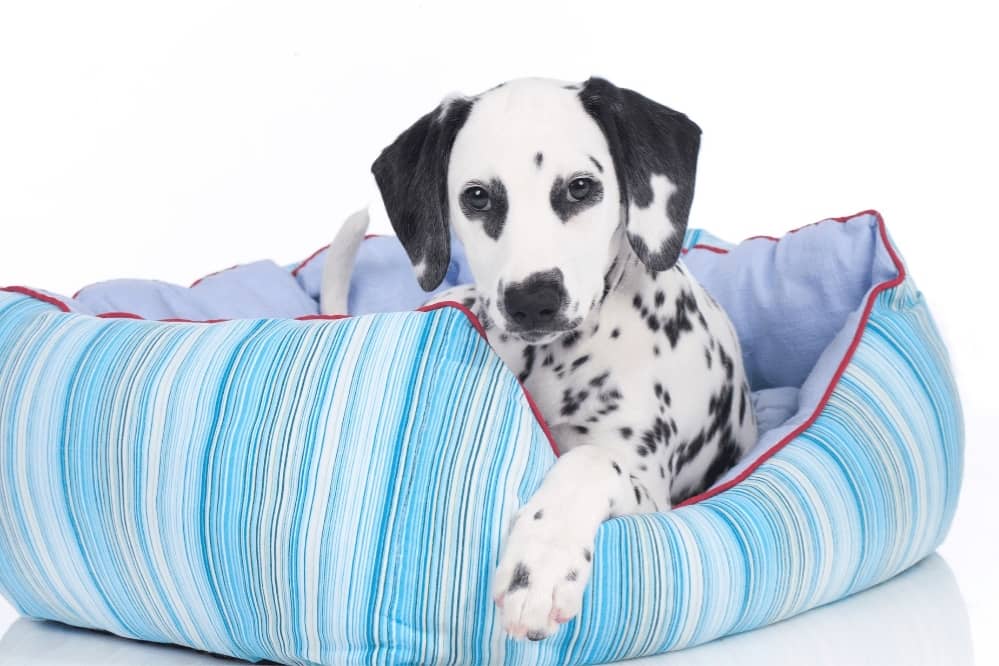When it comes to owning and taking care of animals, there are many different aspects of it that can be enjoyable. Coming home to an animal that is eagerly awaiting your return and spending time to give it the attention that it wants can be a rewarding experience. Many people enjoy being able to care for their animal companions. However, it is important for all pet owners to remember that there are always going to be downsides to anything that you do. For example, while having a dog can be an enjoyable experience for everyone in the house, there are times when a dog’s behavior is less than welcome. A common problem that people tend to experience with their dogs is when the dogs pee on their own dog beds.
Assuming that the dog is old enough to be housebroken, your dog absolutely knows that it shouldn’t be urinating on it’s own bed. However, it may feel as if it has a reason to urinate on it’s bed, whether it is to claim its territory in a multi-pet household or whether it is due to a medical condition. With all of this being said, the way that you are going to have to go about fixing this problem is going to be through figuring out why your dog feels the need to pee on it’s dog bed. Once you have a good idea as to why there is dog pee on it’s dog bed, then you can begin taking the necessary steps to stop your dog from doing it.
Ruling Out Health Problems
First things first, you are going to want to rule out the possibility of any health problems that your dog may be having. It is not fair to your dog to try and correct it’s behavior if the dog is actually incapable of helping itself. There will be a few other signs to look for if the inappropriate urination is caused by a health problem, rather than a behavioral problem.
Typically, in a dog that is having issues with continence and is urinating in it’s bed, there will be other signs of incontinence besides in the bed. The bed is going to be the most common place where leakage happens, simply because your dog likely spends hours sleeping there. In a dog with incontinence issues, you will notice urine dribbling down the dog’s hind legs and getting in the fur around your dog’s backside. Assuming that your dog is well-trained and knows there is a proper spot for urination, there’s even a chance that your dog may be acting guilty, or that it knows that something isn’t right, even if it cannot clearly communicate it to you.
Other issues that can lead to inappropriate urination in dogs include UTIs, or urinary tract infections, bladder stones, diabetes, cognitive and spinal problems, and hormonal urinary incontinence. The last problem tends to be more common in middle-aged, spayed female dogs, but it has been shown to happen in younger and male dogs as well. Additionally, incontinence may come as an unfortunate side effect of aging. If your dog is considerably old, it might be less of a health issue and more just a sign that your dog is going to need a little bit of extra help around the house.
If your dog begins urinating in it’s dog bed out of seemingly nowhere when it was previously housebroken without an issue, you should always try to rule out the possibility of a medical disorder first. Doing this will allow your dog to get the medical care that it needs so that it can live a happier and healthier life, and you won’t have to give a second thought to where you step foot in the house. On the other hand, once you are positive that your dog’s problems are caused by a behavioral issue, you can begin taking the necessary steps to address that behavior. It is simply important that you do not try to correct a medical problem in the same way that you would correct a behavioral problem.
What Kinds of Behavioral Problems Lead to This?
Speaking of behavioral problems, there are a few different situations where you might find that your dog is inclined to urinate on its bed, despite being housebroken and with the knowledge that there is no underlying medical issue leading to this behavior.
For many dogs, this kind of reaction can be caused by emotional distress. This can include general stress, anxiety, and immediate fears. A good example of this is if your dog is incredibly sensitive to the sound of fireworks over the holidays and your dog hears a firework go off near the house, it might urinate in it’s bed to try and comfort itself. By filling it’s bed with a scent that is familiar to the dog, it can act as a soothing mechanism, although it is one that should not be encouraged in any way. One of the best ways that you can work through this kind of behavioral problem is to try and gradually reduce your dog’s fear of the item in question. This can be done through exposure, time, and patience. If it is stress that is causing your dog’s inappropriate urination, then you will need to find the underlying cause of that stress and address it. In some cases, such as when you are moving, you may simply have to do what you can to alleviate the worst of the stress while waiting for your dog to adjust.
Another common example of this can be seen in dogs that have separation anxiety. In dogs who suffer from severe separation anxiety, they will often defecate and urinate all over the house when you are not there. It is believed that the dog is marking its territory and also sending a signal to you that it is in distress, although you will not be able to read that signal because humans do not communicate in the same way that dogs do. To fix this problem, you are going to have to work with your dog to try and lessen the severity of the separation anxiety. There are a few different therapy processes that you can try, although in most cases, it will be a time-consuming process to teach your dog that it will be okay when you leave the house.

